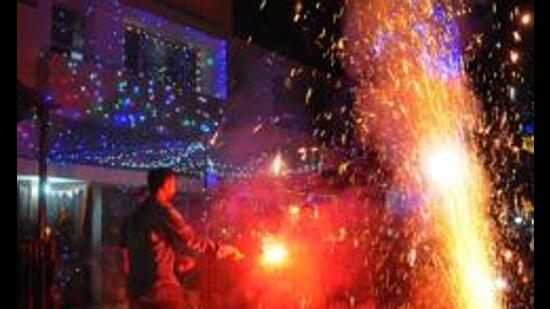Banning crackers can help Delhi air
Delhi announced a complete ban on the manufacture, storage, sale and use of firecrackers in the Capital till January 1, 2023. The early announcement is a welcome move, but curb the menace of stubble burning in neighbouring states also
Delhi announced a complete ban on the manufacture, storage, sale and use of firecrackers in the Capital till January 1, 2023, keeping in line with the practice in recent years where the Supreme Court and the city administration have clamped restrictions on the celebratory usage of crackers as part of efforts to check spiralling air pollution. The announcement, which has come earlier than usual this year, may give the civic administration more time to fine-tune its implementation, which has been patchy and unsatisfactory in the past few years, allowing illegal shops to sell crackers. It might also help avert the financial losses suffered by manufacturers who find it difficult to deal with inventory with a late ban announcement.

When burst in large quantity simultaneously — as happens during a number of festivals, including Diwali — crackers lead to a spike in pollution levels, with gases, pollutants and heavy metals such as arsenic, carbon monoxide, sulphur dioxide and oxides of nitrogen being released, alongside dust. The combustion process leads to a spike in both PM 2.5 and PM 10 concentr-ations, often reaching 20-30 times the safe standard. The impact is transient, but it doesn’t help that this spike happens at a time of the year when farmers in Punjab and Haryana burn stubble, wind speeds are low, rainfall non-existent and temperatures dip, creating a noxious vortex of pollutants shrouding the Capital.
Last year, for instance, Delhi woke up to one of its most polluted post-Diwali mornings in 2021. This was not because the ban was unsatisfactorily implemented but due to farm fires that had spiked in the run-up to the festival (and had contributed as much as a quarter of the pollution load on Diwali) and sluggish wind speeds that were inadequate to disperse the pollutants. Another report by the System of Air Quality and Weather Forecasting And Research (Safar) found that if no firecrackers were to go off, air quality in Delhi would still stay in the poor range, but that widespread bursting would likely push air quality into the severe range (if only temporarily). This underlines the importance of announcing the ban early, promoting awareness among the people, creating robust mechanisms to implement it and prevent violations, and looking at the restrictions as part of a holistic plan to clean the city’s air and not as an isolated policy response. It will be interesting to see if Punjab, which, like Delhi, is governed by the Aam Aadmi Party, is equally proactive in dealing with stubble burning — a bigger problem than firecrackers when it comes to bad air.
All Access.
One Subscription.
Get 360° coverage—from daily headlines
to 100 year archives.



HT App & Website






